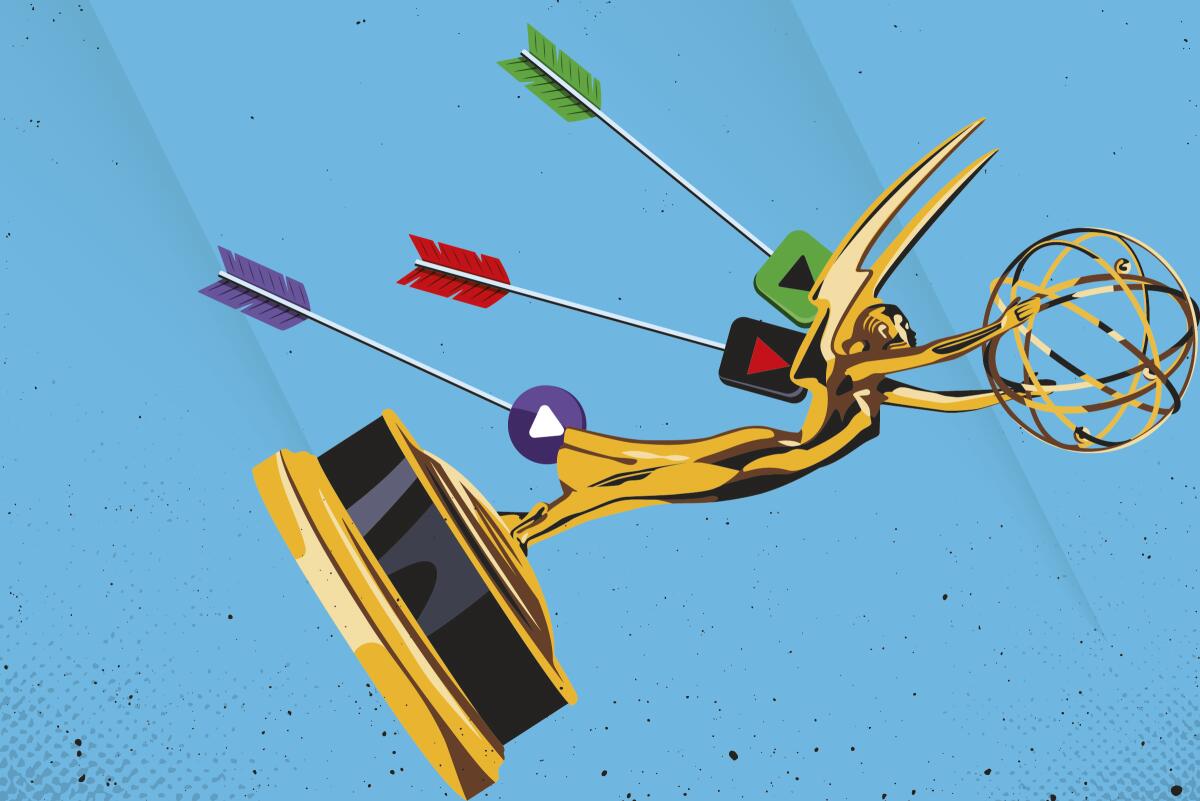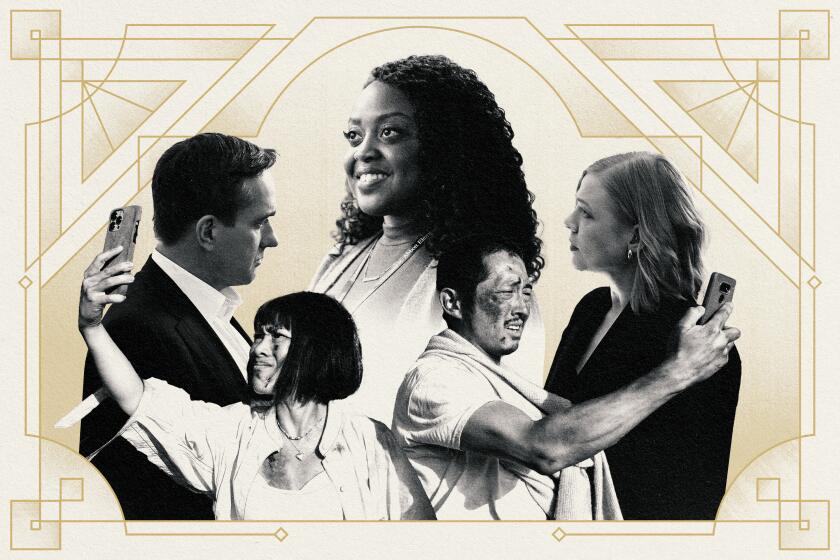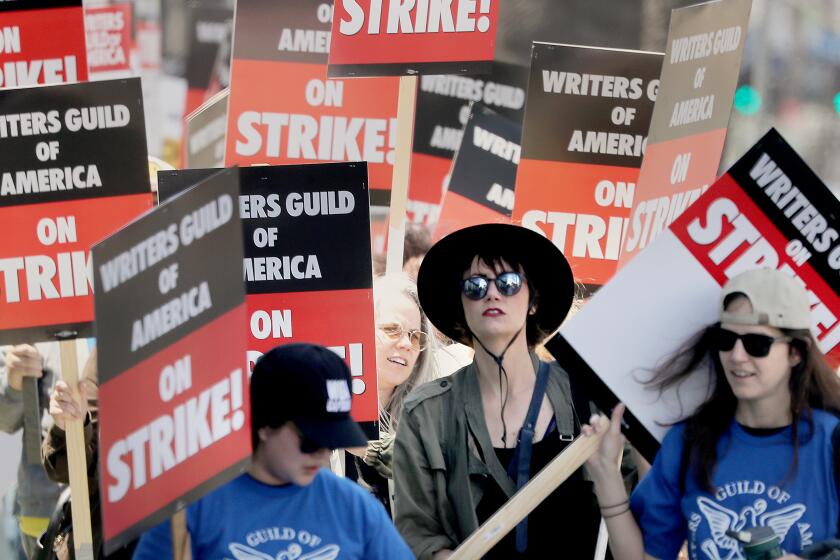The age of the high-flying Emmys is over

- Share via
For nearly two decades, the art form formerly known as television did nothing but grow, in wild and glorious abandon, as if it had been touched by a terraforming agent from “Doctor Who.” Old networks were transformed and new ones sprang up, filling every screen with constantly regenerating stories of every size, shape and hue.
And all of them wanted Emmys. Nothing offered proof of concept better than lots and lots of Emmys, and studios would do anything — including offering gas at the 1950s prices of “The Marvelous Mrs. Maisel” and snarling traffic on the Santa Monica Freeway for hours in the process — to get them.
But endless growth is not sustainable; at some point, delirium must surrender to the larger need of sustainability. If last year’s combined 191-day writers’ and actors’ strikes, with all the vitriolic exchange between creatives and management, has not convinced you that television’s riotous superbloom has officially come to an end, the 75th Emmys might.
Even if Monday’s telecast had not been pushed back four months by the strikes — wait, aren’t we supposed to be thinking about the Oscars now? — the list of nominees is, in most cases, so narrow and predictable that it’s difficult to muster any real excitement over who will win.
Spoiler: HBO.
I’m not saying that HBO did not have a very good year, or that the performances of every cast member in “Succession,” “The White Lotus” and “The Last of Us” were less than terrific. I’m just saying that there were some pretty wonderful performances in other great shows, many of which do not appear on HBO, and it would have been nice if the acting categories in drama had acknowledged that.
“Succession” came to an end in 2023, and many voters no doubt were moved by the fact that it would be their last chance to honor the show. But what are we to make of the five “White Lotus” nominations in the supporting actress category? I know voters watched “Bad Sisters” and “Yellowjackets” because they nominated the female leads. But no one else?
Will Emmy voters send ‘Succession’ and ‘Ted Lasso’ out in style, and will ‘Beef’ sweep the limited series category? Our expert weighs in on the sure bets and surprises in store for the 75th Emmy Awards.
Sorry, sorry, this is not the time to quibble over choices. Emmy voters are merely reflecting the larger problem facing television.
Like visitors entering their third hour in the Louvre, Disneyland or Costco, we have moved past open-mouthed wonder into a state of brain-throbbing stimulus overload.
Even with decent marketing campaigns, many new and ongoing series struggle to be seen; long gone are the days when the cultural conversation revolved around a handful of shows that were breaking the traditional borders of television. Yes, people talk about “Succession,” “The White Lotus,” “The Last of Us” and even “The Crown,” but not the way they once obsessed over “Mad Men,” “Breaking Bad,” “Downton Abbey,” “Homeland,” “House of Cards” and “Game of Thrones.”
As many people have said during the years of “Has it finally peaked yet?” TV, there is so much to see that it is difficult to know where to look. And streaming makes any kind of conversation difficult — we may eventually watch the same show as all of our friends, but who knows when that will be? Probably not in time for the Emmys, that’s for sure.
It’s too bad, and not just for the broadcast networks that host the telecast. For a brief and shining moment (gather ’round now, children), the Emmys played an enormous part in television’s modern efflorescence.
First by helping to lure actors from the big screen to the small — ”Hey, you’ll definitely get an Emmy.” Then, after “Mad Men” jump-started a revolution by proving that even a cable channel once devoted to old movies could produce award-winning original content, by offering golden validation.
Following the template set by AMC in 2007, any network or, later, streaming platform getting into the original content business inevitably came out swinging with a big “prestige” drama. These were designed not so much to grab big audiences, which were dwindling with each entrant, but to be critically well-received and make multiple nomination lists.
Suddenly, an Emmy wasn’t just the cherry on top of the cake. It was the cake, proof that AMC, Netflix, the History Channel, Hulu, Amazon, et al., were officially in the game.
Juggernauts such as ‘Succession,’ ‘Ted Lasso’ and ‘Abbott Elementary’ ruled the Emmy nominations once again. Here’s the full list.
Faced with new competition and a growing appreciation and demand for great television, HBO, Showtime and FX explored new territory as well, bringing in A-list actors, writers and directors as well as excruciatingly bloody violence, increasingly explicit sex scenes and even more naked women.
And with every network and platform wanting its name at the top of the nominations-haul list, the Emmys race, once a slightly flashy hometown affair, went nuclear, with deep-pocketed campaign strategies that rivaled the Oscars. Lavish screenings, wildly creative pop-up events, enormous ads everywhere — Emmy FYC made “awards season” a year-round phenomenon.
As the ever-expanding TV landscape splintered the audience into smaller segments, the Emmys grew in value. Let broadcast networks worry about ratings; cable and streaming would concentrate on “excellence,” grab all the statuary and add “award-winning” to their algorithms.
It worked, as far as it went. Twenty years ago, four of the five drama series nominees (including “CSI: Crime Scene Investigation”) were broadcast shows (the fifth, “The Sopranos,” won), as were three of the five comedy nominees (Fox’s “Arrested Development” won). Then, shows confined by censors and dependent on high ratings slowly began to fall off the Emmy lists, including onetime perennials like “House,” “The West Wing,” “Grey’s Anatomy,” “Boston Legal” and “Lost.”
Since the major streaming platforms got into the original programming game, only one broadcast series (“This Is Us”) has even been nominated for best drama. The last to win, “24,” did so when George W. Bush was still in the White House. This time around, broadcast has no drama nominees at all and only one comedy, “Abbott Elementary,” in the running.
Certainly, the Emmys both aided and reflected the audience transition from broadcast to cable and thence to streaming. This was not an accident; pushing first “House of Cards” and then “The Crown” with the ferocity of a “Toddlers & Tiaras” mom, Netflix entered an arms race with HBO, trying to break HBO’s annual chokehold on most nominations and wins, which it finally did in 2021.
Column: Streamers profited when ‘the idiot box’ became art. They forgot writers made it that way
Television’s most recent ‘Golden Age’ set off a gold rush that transformed Hollywood. The writers’ strike means the boom has finally gone bust.
Though HBO’s 127 nominations this year — 24 more than Netflix and almost double third-place Hulu — may put to rest any fears about the premium cable network‘s post-”Game of Thrones” decline, it still marks the end of an era for the Emmys.
As the strikes made clear, television in all its forms has finally peaked, in quantity if not quality. After years of lavish spending, the piper, and the writers and the actors, must be paid. “Contraction” is the watchword now as CEOs realize that you cannot live by statuary alone. All those new platforms they created with pomp and high-flying Emmy campaigns need to turn a profit, something broadcast networks have known all along.
With a two-pronged strike and a delayed telecast, it was impossible for this year’s nominees to participate in the kind of frenzied campaigns seen before 2020, when the COVID-19 pandemic shut everything down. Even so, it’s difficult to imagine that we will see a return to that kind of attention, spending and furor anytime in the near future.
New platforms no longer need to chase Emmys as a way to establish themselves — although it would have been nice for Peacock to get a comedy series nod for “Poker Face” — if only because, God willing, there will be no more new platforms.
Likewise, the expensive period/fantasy drama, built like a (say it with me now) 10- (or eight- or six-) hour movie, may be the first casualty of the new world order. By searching for larger audiences that remain engaged for longer periods (“Suits,” anyone?), the industry is already leaning away from niche and toward a more traditional series model, with more episodes and broader appeal.
“Better Call Saul,” the last living descendant of TV’s High Elder days, technically still has a chance at a few long-overdue Emmys, which would bring AMC back into the picture it helped redefine. But according to my colleague Glenn Whipp, who is annoyingly accurate about these things, it will be HBO’s year.
Some things never change. But in television, many, including the Emmys, are about to. Drastically.
More to Read
The complete guide to home viewing
Get Screen Gab for everything about the TV shows and streaming movies everyone’s talking about.
You may occasionally receive promotional content from the Los Angeles Times.










